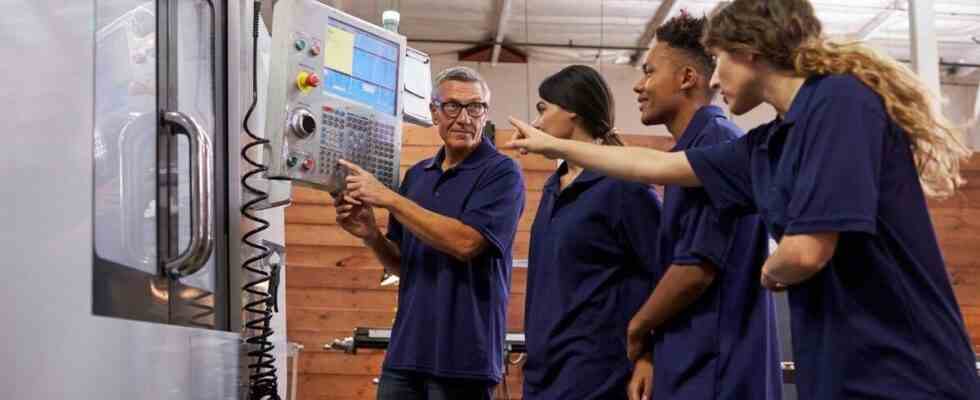This is one of the only points on which Marine Le Pen and Emmanuel Macron agreed this Wednesday, during the televised debate between the two rounds: the need to boost learning. And this for several reasons, as explained by Pascal Picault, president of the National Federation of Directors of Apprenticeship Training Centers (Fnadir): “It is the end of the degraded image of learning. From now on, everyone knows that it works and that it solves both the growing difficulty some employers have in recruiting and the problem of youth unemployment. »
Aurélien Cadiou, president of the National Association of Apprentices of France (Anaf), also underlines the many benefits that both parties derive from this type of training: “The tuition fees are paid for by the employer, the apprentices right to specific aid to find accommodation and pass the driving licence. And they get a diploma while setting foot in professional life. For companies, it is a way to train young people in the skills they need and to pre-recruit”. Moreover, the conditions for professional integration at the end of an apprenticeship are excellent: according to a study of the Dares published in March 2022, in July 2021, one year after leaving their studies in the summer of 2020, 69% of apprentices had paid employment in the private sector.
A significant effect on the youth unemployment rate
Politically too, learning is a very useful tool. Because it mechanically lowers the youth unemployment rate. In total, according to a OFCE study published in March 2022, “422,000 apprenticeship jobs would have been created in two years [entre fin 2019 et fin 2021], explaining the vast majority of jobs created since 2019”. And to conclude: “The very sharp drop in the unemployment rate, particularly that of young people, would therefore be based on a very significant contribution from learning”.
It is therefore not surprising that Emmanuel Macron indulged in an exercise in complacency on this theme, declaring that France had gone from “300,000 apprentices at the start of the five-year term to 710,000 today”. This progress can be explained by two reasons: first by the apprenticeship reform in 2018, which made it possible to remove certain obstacles. “She liberalized learning. Because before this, to open an Apprentice Training Center (CFA) or a class in one of them, you had to obtain the approval of the Regional Council, ”notes Aurélien Cadiou. “It could take a year, and now it takes three days. As a result, we have gone from around 1,000 CFA in 2018 to 2,000 today”. Moreover, if it was previously necessary to stick to the school calendar to sign an apprenticeship contract, it can now be done at any time of the year.
Hiring aids that played full
The second reason for the skyrocketing of apprenticeship contracts during the five-year term is based on the revaluation of the aid from which companies have benefited since 2022. Since the Covid-19 crisis, an exceptional apprenticeship bonus has been put in place even more interesting: it is a financial aid of 5,000 euros for each work-study contract concluded with a minor, and 8,000 euros for adult apprentices. “And while the aid was reserved for employers with fewer than 250 employees, it is now accessible to all companies”, underlines Aurélien Cadiou.
On the strength of these observations, the contenders for the Elysée Palace are well aware that they have every interest in still supporting learning. If elected, Emmanuel Macron will extend, at least in the short term, this exceptional bonus, initially scheduled to end at the end of June. Marine Le Pen also announced an apprenticeship check which will benefit businesses. The latter will receive 2,750 euros for hiring a young person under 16, or 4,000 euros for someone over 16. At the same time, the RN candidate wants to increase the income of work-study students, by granting a monthly bonus of 230 euros to all those under 18 and 330 euros for 18-25 year olds. “We can imagine that after 2023, the president will gradually reduce aid to grant it only to certain sectors, for example”, launches Pascal Picault. But taking care all the same not to break the dynamic…

